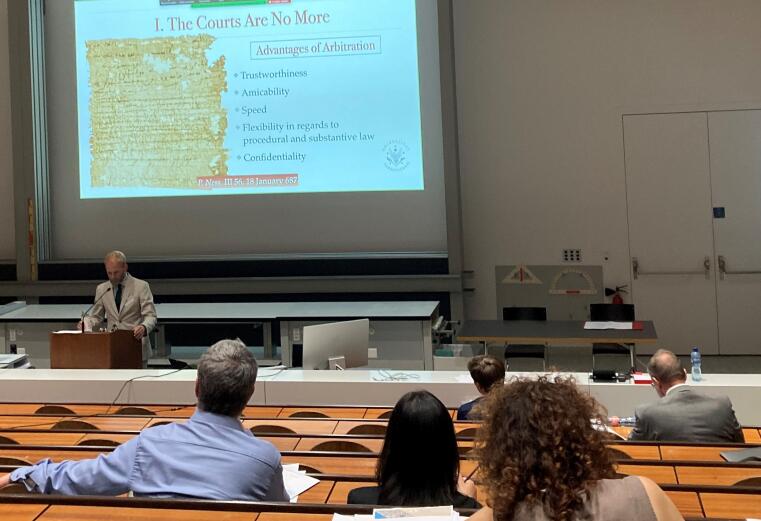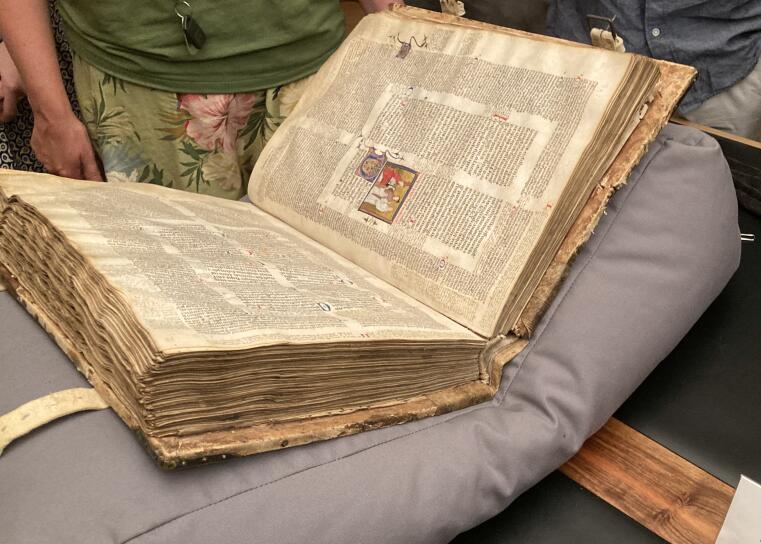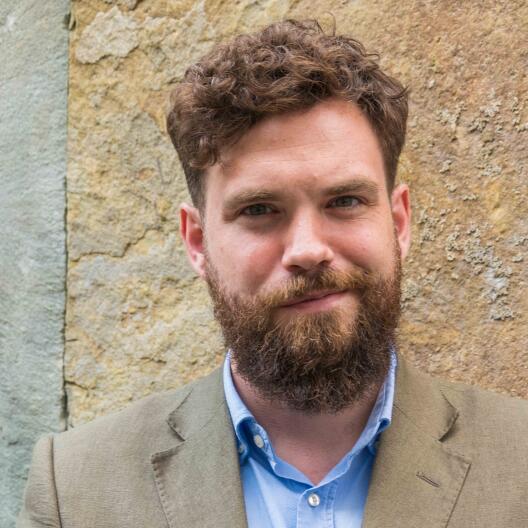Legal unity and pluralism at the 2022 Conference of Legal Historians
by Jan Matthias Hoffrogge
Probably the most important such conference in the German-speaking world, the 43rd (German)[1] Conference of Legal Historians (Rechtshistorikertag) could at last take place in Zurich in August 2022.[2] Addressing the overarching theme of “Legal Forms of Validity”, the conference was of particular interest to our Käte Hamburger Kolleg. Therefore, not only the two directors but also a number of staff members as well as former, current and future fellows travelled to the Limmat.

Valuable discussions
For one thing, there was the opportunity in Zurich for us to exchange ideas with new and former fellows, and to hear about their research. Jakub Urbanik (Warsaw), who will join the Kolleg as a fellow in September 2022, used selected papyri sources to reveal the characteristics of arbitral jurisdiction in the ancient world, arguing in particular against A. Arthur Schiller’s thesis that there were no courts in late antiquity.

Sebastian Spitra (Vienna), fellow in the first cohort at the Kolleg, received the prestigious prize awarded by the Conference of Legal Historians for his recently published dissertation on “The Administration of Culture in International Law” („Die Verwaltung von Kultur im Völkerrecht“), which also provided the groundwork for his Kolleg project.
Susanne Lepsius (Munich), fellow at the Kolleg since April 2022, chaired a section on “Expert Cultures of Law”, and José Luis Alonso, professor in Zurich and member of the Kolleg advisory board, was one of the hosts of the well organised conference.
The Kolleg participants soon got into conversations about current and future projects at the Kolleg, as well as academic life in Münster. The unanimous verdict was that no zoom conference can replace such personal discussions.
Relevance of legal unity and pluralism
At the same time, the lectures were closely related to our research agenda. On Tuesday morning, there was a separate section on “Legal Pluralism”. More than a side note here was a reference by Danica Summerlin (Sheffield), who began by relating her research on the pluralism of canon law in the Middle Ages to a national legalism in the United Kingdom (a desire to standardise law under national auspices), which had contributed among other things to Brexit.
Also relevant was a plenary lecture given by Lauren Benton (Yale) and moderated by Thomas Duve (Frankfurt), who is also a member of the Kolleg’s advisory board. Benton’s work on legal unity and pluralism in the pre-modern era has already been the subject of one of our reading sessions. She spoke (unfortunately only via zoom) about international law in an imperial context, focusing in particular on the phenomenon of protection shopping. In the 19th century, for example, the inhabitants of the Cocos Islands concluded agreements with both the Netherlands and Great Britain, thereby playing the two great powers off against each other. Other examples were Portuguese colonies in 16th-century India, as well as Mongol rule in Baghdad in the 13th century. Thus, there was a broad spectrum of themes, but in the discussion, participants asked for deeper historical investigations.
Even without mentioning legal unity and plurality in their titles, a number of lectures dealt with these phenomena. This was especially true of the so-called Forum of the Young. Kristin Boosfeld, who recently completed her postdoctoral dissertation (habilitation) in Münster, told her audience about the effect that the writings of legal scholars from the province of Holland, such as Hugo Grotius, had on legal unity in the 17th-century Netherlands. Arnaud Besson (Athens) pointed to a “conflict of laws” in relation to the ancient Greek poleis after they were incorporated into the Roman Empire.
Phenomena of legal unity and pluralism were also addressed by Jakob Tanner in his ceremonial evening lecture. Starting from the relationship between general historiography and legal history, Tanner outlined two research areas for the future: the emergence of (and threats to) the protection of fundamental rights, and the genesis of international private law in the 19th century. Having previously argued that both general historiography and legal history have focused increasingly in recent decades on the “hybridity and internal differentiation” of law, Tanner pointed out in his lecture that this new approach no longer sees law as a mere derivative of power and facilitates interdisciplinary exchange.
Authentic legal pluralism: St. Gallen Abbey Library
What should also be mentioned is our excursion to the Abbey Library of St. Gallen, where the participants encountered legal pluralism in a very real way. The ten-metre-high wall that separated Catholics (in the Abbey district) and Protestants (in the suburbs) after the Reformation, and that also marked a state border, was of course dismantled after the two dominions were unified in Napoleonic times. But spread over the former monastery buildings, the museum provides an insight into the legal-historical diversity of this landscape, where the prince abbot competed with the city and in many cases shared sovereign rights. One highlight of the exhibition is the 9th-century monastery plan of Reichenau Island, which was intended as a blueprint for the new imperial monasteries. The plan is shown for 20 seconds at a time as part of an educational film presentation.[3]

Even more impressive, however, were the medieval codices that were shown to us in small groups during the guided tour, including a volume from 793 with so-called leges barbarorum (formerly often translated as “tribal laws”). Although provided with a new spine in later centuries, the codex is still an authentic remnant of medieval legal culture. Such documents were important at that time because different laws applied to members of different “tribes” (legal communities) within a territory, so a Frank, for example, was sentenced differently than an Alemanni for the same offence. Thus, we saw a very early, parchment testimony of legal pluralism, which we could directly exchange views about from different perspectives.
These few highlights (more detailed reports will be published by Peter Oestmann in the Frankfurter Allgemeine Zeitung and by Gregor Albers in the Zeitschrift für Rechtsgeschichte) may already show that the overarching themes of the Kolleg receive a great deal of attention in research on legal history across all epochs and countries. Even more important perhaps is that they ultimately always touch upon present-day realities, as can be seen especially with regard to national legalism already mentioned.
Conference website with programme
References
[1] The adjective was dispensed with in view of the venue – for the first time, as Peter Oestmann noted in a report for the Frankfurter Allgemeine Zeitung on 24 August 2022, and perhaps not only because of the venue. A side note: one of the ceremonial speeches mentioned the “European Conference of Legal Historians”, which is not entirely wrong, since the speakers and participants came from, for example, Germany, Austria, Switzerland, Italy, Belgium, Finland, Great Britain, Slovakia, Poland, Sweden, and the Netherlands.
[2] The event was delayed by two years due to the pandemic, such postponements having been the norm in the early years of the conference. See a short description by Michael Stolleis in the first volume of the Handwörterbuch der Rechtsgeschichte, available at http://www.rechtshistorikertag.de/geschichte/ (22 August 2022).
[3] For this purpose, a model is raised for a few seconds and the plan is illuminated with special lamps that do not damage the object.


